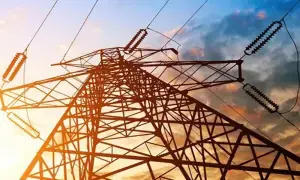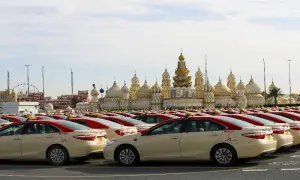Explainer wanted, more skills for workers as green jobs grow
5 min readAs scientists increasingly sound the alarm about the impacts of accelerating climate change and nature loss on our lives, the need to transform the global economy to run on clean energy, cut waste and reuse natural resources is becoming ever more urgent.
To make that happen, we will have to change the way we work.
Economists say there are huge opportunities in acting fast to phase down the use of fossil fuels, reduce planet-heating emissions, protect forests and wildlife, and recycle materials.
Putting in place the policies and investments to move businesses and consumers onto a more sustainable path could create tens of millions of green jobs this decade, studies say.
But one key factor holding back the green economy, according to labour market experts, is a global lack of the skills required to build it, which are poorly understood and promoted.
What is a green job?
Common perceptions of green jobs include installers of solar panels, wind turbines and heat pumps or conservationists working in nature reserves. But, in fact, the field is much broader.
The fast-expanding electric vehicle sector, for example, requires miners to provide the metals, assembly-line workers and engineers to make the cars and scooters, mechanics to maintain them, and urban planners to design green transport systems.
According to professional networking platform LinkedIn, green jobs are occupations that demand extensive knowledge of green skills, such as solar consultant and sustainability manager, but they accounted for only 1% of global hires in 2021.
In a 2022 report, LinkedIn also talked about “greening jobs” (9% of hires) and “greening potential jobs” (40% of hires), which it defines as those that can be performed without green skills but typically require some level of them.
Of the two, “greening job” workers have a higher intensity of green skills. Examples include heating and air-conditioning technicians, logistics managers and construction workers.
What skills are needed for a green job?
There is a growing awareness among governments and businesses that adopting less-polluting and healthier lifestyles will require major changes to nearly every economic sector - from food to fashion and forestry to finance.
“Right now, we’re thinking about this really specific set of things that are called green jobs - and really what we should be thinking about is how can we make every job something that is partially green,” says Nick Pesta, a senior strategy associate at RMI, a U.S.-based energy transition think tank.
That will require a huge boost in green skills which enable the environmental sustainability of economic activities and can be deployed across a wide range of existing and new professions.
Examples include pollution mitigation and waste prevention, environmental restoration, sustainable procurement, energy generation and management, and carbon emissions accounting.
Some experts cast the net wider to add softer skills such as systems thinking, creative abilities and risk management.
LinkedIn says the share of “green talent” - meaning members that have explicitly added green skills to their profile and/or are working in a green or greening job - is on the rise, increasing to 13.3% in 2021 from 9.6% in 2015.
But green talent is growing at a slower rate than job postings that require green skills, it adds.
Experts are calling for urgent action by governments, companies and educational institutions to train both older and younger generations for the green workforce the world will need.
“The opportunities can include being a more competitive, resilient business in the market, as well as supporting employees to be happier and more productive,” explains Nicole Sherwin, senior vice president for executive customer advisory and strategy with sustainable business ratings agency EcoVadis.
Which green jobs and skills are growing fastest - and where?
The top five fastest-growing green jobs from 2016 to 2021, according to LinkedIn, were sustainability manager - with 30% annual growth - followed by wind turbine technician, solar consultant, ecologist, and environmental health and safety specialist.
For green skills, sustainable fashion was the fastest-growing globally - from designers and stylists to merchandisers - rising at an average of 90% per year in the same period.
Other examples are expertise in cleaning up oil spills, environmental services, water management and climate.
While green jobs and people with such skills are spread across most of the world, they tend to be concentrated in richer countries, such as the United States, Britain and Australia.
However, jobs in big emerging economies, such as India, Brazil, South Africa and Indonesia, also rely more on green skills than the global average.
A 2023 study of 10 economies by the World Economic Forum calculated that to meet their environmental objectives, those countries - Australia, Brazil, Britain, China, Germany, India, Japan, South Africa, Spain and the United States - require at least 12 million more green jobs - or a 66% increase.
The greatest unmet need is in agriculture and forestry at 11 million jobs, it said, with other key sectors including infrastructure at 480,000 jobs, government at 160,000 and energy at 50,000.
There is also a global gender gap - with men more likely to have green skills than women, something that has barely changed in recent years. In 2021 there were only 62 women for every 100 men considered as green talent, according to LinkedIn.
Other concerns include the fact that there is often a mismatch between areas where fossil fuel mines or power plants are closing and new clean energy industries are springing up, as that makes it harder for workers to transition between roles.
And the quality of some jobs has been questioned, especially in developing countries with high levels of informal employment.
For example, in India, construction work on solar power plants is often temporary, leaving locals with few longer-term opportunities.
For the latest news, follow us on Twitter @Aaj_Urdu. We are also on Facebook, Instagram and YouTube.


























Comments are closed on this story.